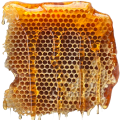 About 3% of the population has honey intolerance. For that reason the use of honey as therapeutic treatment should be accompanied by a study of the patient’s allergic history.
About 3% of the population has honey intolerance. For that reason the use of honey as therapeutic treatment should be accompanied by a study of the patient’s allergic history.
Biological Test for Honey Tolerance
Any manifestations of allergy in a patient or his relatives should prompt the physician to take a more careful approach in deciding on the use of honey. The patient with hay fever, as well as severe allergic syndromes of other genesis, should not take honey in any form. For any mild allergy and, in doubtful cases, the patient must be biologically tested for a tolerance to a particular honey variety. One of the following tests can be used:
- take honey inside in the amount of “On the tip of a knife”;
- make 50% solution of the honey with cooled boiled water by (if honey is crystallized, wait until it is completely dissolved) and add 1-2 drops into the conjunctival sac of the eye;
- apply to skin areas of 5×5 cm on the inner surfaces of the left and right forearm as follows:
-
- rub the place with 70° alcohol,
- dry the skin,
- apply a drop of whole or diluted honey on one of them,
- apply a scratch on the skin on the other hand (control hand), then on the hand with a honey.
Check in an hour after the test. In the absence of significant redness of the sclera, swelling, itching, tearing or general reaction in the form of fever, skin itching, itching in the nose, eyes, rash, swelling of the skin honey can be taken. If reaction to honey at the site of skin scarification is normal, on both hands will be the same quickly passing redness. An allergic reaction, as a rule, appears more often soon after the test (immediate type reaction), although a reaction is possible even after a few hours or even days (a delayed type reaction).
In the absence of a local or general allergic reaction the honey can be taken, however, in the first days the dose should be minimal – no more than 1 teaspoon per day. Going further, it can be increased to a dose corresponding to the age. If there are signs of allergies, the honey should not be taken. It should be noted that the symptoms of intolerance may appear in a few days. For people who have used honey in the past, intolerance may still occur due to a change in the reactivity of the organism or in the presence of an unknown allergenic component in the used variety of honey. People with allergies to antibiotics deserve special attention because some beekeepers add antibiotics to bees for the treatment and prevention of bee diseases. The test must be also repeated when changing the grade of honey
Every consumer should be informed that during the use of honey, he/she needs to be attentive to his sensations and general condition. If any signs of intolerance appear, regardless of the way honey enters the body, contact with honey should be stopped. Signs of intolerance to honey can be:
- burning in the eyes, numbness and itching of the skin or mucous membranes, their swelling, redness, increased local temperatures, nasal congestion;
- a sharp increase in body temperature, a feeling of severe weakness and headache, a feeling of heaviness in the body;
- the appearance of rash, angioedema, point hemorrhages;
- nausea, vomiting, abdominal pain without diarrhea or with diarrhea;
- difficulty breathing, choking attack;
- collapse, shock.
Analyzing all available information about the use of honey, we can conclude that honey is absolutely contraindicated for use (ingestion, topical, rinsing, inhalation, electrophoresis, and phonophoresis) if:
- the presence in the history of a person that an allergic manifestations of any nature arising from contact with honey;
- the appearance of signs of intolerance of honey when performing a test of tolerance;
- the patient has a pronounced allergy of another genesis;
patient has type I diabetes; - aggravation of a peptic ulcer or stomach and duodenum;
- exacerbation of gallstone and urolithiasis;
- acute gastritis;
- acute pancreatitis;
- increase in body temperature above 38° C.
Due to the risk of allergic bronchospasm and increased broncho-pulmonary insufficiency, the use of honey aerosol for medical purposes is contraindicated in case of:
- expressed pulmonary emphysema,
- pulmonary heart disease, pneumosclerosis,
- chronic bronchitis with respiratory failure,
- lung hemorrhage,
- pulmonary infarction
Temporary avoidance of honey in the diet and treatment is recommended in case of:
- acute rheumatism,
- enterocolite,
- chronic pancreatitis,
- chronic cholecystitis with bile stasis,
- hyperglycoderma (dermatosis with a delay of carbohydrates in the skin),
- exudative diathesis,
- after cholecystectomy for gallstone disease,
- after gastrectomy for peptic ulcer disease (within 3-4 months).
